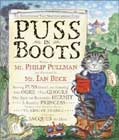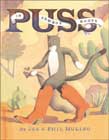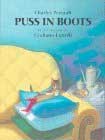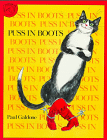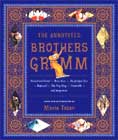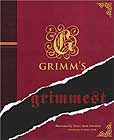| Introduction | Annotated Tales | eBooks | Bookstore | Illustration Gallery | Discussion Board | Blog |
 |
|
|
The Poor Miller's Boy and the Cat Don't miss SurLaLune's annotated version of a variant of this tale at: IN a certain mill lived an old miller who had neither wife nor child, and three apprentices served under him. As they had been with him several years, he one day said to them, "I am old, and want to sit in the chimney-corner, go out, and whichsoever of you brings me the best horse home, to him will I give the mill, and in return for it he shall take care of me till my death." The third of the boys was, however, the drudge, who was looked on as foolish by the others; they begrudged the mill to him, and afterwards he would not have it. Then all three went out together, and when they came to the village, the two said to stupid Hans, "Thou mayst just as well stay here, as long as thou livest thou wilt never get a horse." Hans, however, went with them, and when it was night they came to a cave in which they lay down to sleep. The two sharp ones waited until Hans had fallen asleep, then they got up, and went away leaving him where he was. And they thought they had done a very clever thing, but it was certain to turn out ill for them. When the sun arose, and Hans woke up, he was lying in a deep cavern. He looked around on every side and exclaimed, "Oh, heavens, where am I?" Then he got up and clambered out of the cave, went into the forest, and thought, "Here I am quite alone and deserted, how shall I obtain a horse now?" Whilst he was thus walking full of thought, he met a small tabby-cat which said quite kindly, "Hans, where are you going?" "Alas, thou canst not help me." "I well know your desire," said the cat. "You wish to have a beautiful horse. Come with me, and be my faithful servant for seven years long, and then I will give you one more beautiful than any you have ever seen in your whole life." "Well, this is a wonderful cat!" thought Hans, "but I am determined to see if she is telling the truth." So she took him with her into her enchanted castle, where there were nothing but cats who were her servants. They leapt nimbly upstairs and downstairs, and were merry and happy. In the evening when they sat down to dinner, three of them had to make music. One played the bassoon, the other the fiddle, and the third put the trumpet to his lips, and blew out his cheeks as much as he possibly could. When they had dined, the table was carried away, and the cat said, "Now, Hans, come and dance with me." "No," said he, "I won't dance with a pussy cat. I have never done that yet." "Then take him to bed," said she to the cats. So one of them lighted him to his bed-room, one pulled his shoes off, one his stockings, and at last one of them blew out the candle. Next morning they returned and helped him out of bed, one put his stockings on for him, one tied his garters, one brought his shoes, one washed him, and one dried his face with her tail. "That feels very soft!" said Hans. He, however, had to serve the cat, and chop some wood every day, and to do that, he had an axe of silver, and the wedge and saw were of silver and the mallet of copper. So he chopped the wood small; stayed there in the house and had good meat and drink, but never saw anyone but the tabby-cat and her servants. Once she said to him, "Go and mow my meadow, and dry the grass," and gave him a scythe of silver, and a whetstone of gold, but bade him deliver them up again carefully. So Hans went thither, and did what he was bidden, and when he had finished the work, he carried the scythe, whetstone, and hay to the house, and asked if it was not yet time for her to give him his reward. "No," said the cat, "you must first do something more for me of the same kind. There is timber of silver, carpenter's axe, square, and everything that is needful, all of silver, with these build me a small house." Then Hans built the small house, and said that he had now done everything, and still he had no horse. Nevertheless the seven years had gone by with him as if they were six months. The cat asked him if he would like to see her horses? "Yes," said Hans. Then she opened the door of the small house, and when she had opened it, there stood twelve horses, such horses, so bright and shining, that his heart rejoiced at the sight of them. And now she gave him to eat and drink, and said, "Go home, I will not give thee thy horse away with thee; but in three days' time I will follow thee and bring it." So Hans set out, and she showed him the way to the mill. She had, however, never once given him a new coat, and he had been obliged to keep on his dirty old smock-frock, which he had brought with him, and which during the seven years had everywhere become too small for him. When he reached home, the two other apprentices were there again as well, and each of them certainly had brought a horse with him, but one of them was a blind one, and the other lame. They asked Hans where his horse was. "It will follow me in three days' time." Then they laughed and said, "Indeed, stupid Hans, where wilt thou get a horse?" "It will be a fine one!" Hans went into the parlour, but the miller said he should not sit down to table, for he was so ragged and torn, that they would all be ashamed of him if any one came in. So they gave him a mouthful of food outside, and at night, when they went to rest, the two others would not let him have a bed, and at last he was forced to creep into the goose-house, and lie down on a little hard straw. In the morning when he awoke, the three days had passed, and a coach came with six horses and they shone so bright that it was delightful to see them! and a servant brought a seventh as well, which was for the poor miller's boy. And a magnificent princess alighted from the coach and went into the mill, and this princess was the little tabby-cat whom poor Hans had served for seven years. She asked the miller where the miller's boy and drudge was? Then the miller said, "We cannot have him here in the mill, for he is so ragged; he is lying in the goose-house." Then the King's daughter said that they were to bring him immediately. So they brought him out, and he had to hold his little smock-frock together to cover himself. The servants unpacked splendid garments, and washed him and dressed him, and when that was done, no King could have looked more handsome. Then the maiden desired to see the horses which the other apprentices had brought home with them, and one of them was blind and the other lame. So she ordered the servant to bring the seventh horse, and when the miller saw it, he said that such a horse as that had never yet entered his yard. "And that is for the third miller's boy," said she. "Then he must have the mill," said the miller, but the King's daughter said that the horse was there, and that he was to keep his mill as well, and took her faithful Hans and set him in the coach, and drove away with him. They first drove to the little house which he had built with the silver tools, and behold it was a great castle, and everything inside it was of silver and gold; and then she married him, and he was rich, so rich that he had enough for all the rest of his life. After this, let no one ever say that anyone who is silly can never become a person of importance. NOTES From Zwehrn. This is the story of how Dummling came to great good fortune (see note to No. 63), but it is told with peculiar gracefulness. In their hearty contempt for Dummling, the other apprentices intentionally bring lame and wall-eyed horses, just as 'the two elder princes bring coarse linen and ugly women. Another story from Paderborn contains much that is special. The miller sends out his three sons, and the one who brings back the best horse is to have the mill. The youngest-the simpleton-meets a little gray man, serves him faithfully and honourably as a wood cutter for one year, and for this receives the most beautiful horse. The brothers meet him on his way home, and as one of them has a blind horse and the other a lame one, they seize Dummling's, and thrust him into a lime pit. But the little gray man comes and pulls him out and anoints him with salve, so that he returns to life and health; his horse too is given back to him. He goes with it to his father; the latter, however, does not give him the mill, but says that it shall belong to the one who brings him the best shirt. Dummling procures the shirt, but the brothers bind him to a tree, and shoot him dead. The little gray man brings him back to life again, but when he arrives at home with the shirt, his brothers have told his father that he is in league with the Devil. The father maintains that they must go forth once more, and the one who brings home the best loaf of bread shall have the mill, for the Devil has no power over bread. Dummling meets an aged woman in the forest, and shares his food with her, and in return for this she gives him a wishing-rod. Next day when he is standing on a bridge, and feeling very hungry, he holds the wishing-rod over the water, and a little tortoise comes out to him. "What is the use of that to me?" thinks he, but puts the little creature on the wall of the bridge. When he is going away, it cries after him, "Take me with you! Take me with you!" He thrusts it in his pocket, and the next time he puts his hand into it, he finds great piles of money. And now all goes well with him, he treats the tortoise with great respect, hires the best room in an inn for himself, puts it in the bed there, and travels onwards to seek the best bread. When a year has gone by, he returns without having found it; but when he looks at the tortoise, it has got two pretty white feet. "Hallo! What's that?" thinks he, and covers it up warmly. One night when he is lying in bed and trying to think how he is to obtain the bread, he sees something in the shade which looks like some one standing kneading bread in a dish. At night he dreams that this has become the best bread, and next morning when he awakes the most beautiful bread really is lying before him. He takes it home, and every one is forced to own that he has gained the victory. Then he returns to his tortoise and sees a wonderfully beautiful princess lying in the bed with the tortoise by her side. She tells him that she has been bewitched by her mother, but that he has delivered her. Then she promises to be his wife, but must first go home to her father. "Just go home," Says she. "When thou bearest the first cannon fired, I shall be dressing myself; when the second is fired, I am getting into the carriage; at the third, look round at the six white horses with which I shall drive up." All this comes to pass, and they are married and live for a long time in great happiness. But then it chances that he is so unfortunate as to let the tortoise (which she has preserved with the greatest care) fall into the fire, which makes the princess so angry that she spits in his face. He is very sad, and goes away at once, and digs a cave for himself five and twenty fathoms deep under ground, and there he means to pass his life. He has an inscription carved above it, "Here no one shall find me, save God alone." Thus he lives for many years in prayer. The old king becomes ill and travels about and goes to every physician and tries every remedy, but all in vain. Then by accident he comes to this cave, and straightway he is cured. He looks around, reads the inscription, and orders his people to dig down until at last they come to the cave. The man whom he finds will, however, not come up, and his only desire is to go to God; but the aged ling at length prevails on him to ascend with him. Then the king discovers that he is his son-in-law, and brings about a reconciliation between him and his daughter, and they live together long and happily. In Zingerle, p. 171; in Colshorn, No. 15; in Swedish, compare a popular ballad (see further on), in Cavallius, see p. 300; in French see La Chatte Blanche, in D'Aulnoy (see note to No. 19); in Polish, see Lewestam, p. 101; in Albanian, Hahn, 2. Grimm, Jacob and Wilhelm. Household Tales. Margaret Hunt, translator. London: George Bell, 1884, 1892. 2 volumes. Return to Household Tales by Jacob and Wilhelm Grimm |
|
| ©Heidi
Anne Heiner, SurLaLune Fairy Tales E-mail: heidi@surlalunefairytales.com Page created 10/15/06; Last updated 10/28/07 www.surlalunefairytales.com |


